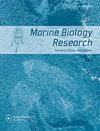Aggregation patterns in juvenile southern king crab Lithodes santolla (Molina, 1782). Are the aggregations related to moulting activity?
IF 1.2
4区 生物学
Q4 ECOLOGY
引用次数: 0
Abstract
ABSTRACTThe early life history of decapod species involves several stages and ontogeny-related shifts in habitat requirements and behaviour. Early publications have reported that, in the San Jorge Gulf (45–47°S), Argentina, juvenile southern king crab Lithodes santolla (Molina, 1782) (SKC) remain in rocky coastal habitats for at least three years, prior to their migration to soft bottoms. In this study, we analysed the gregarious behaviour of juvenile SKCs and its relation with moulting activity through the early ontogeny of the species. Different aggregation patterns were observed in SKC juveniles during sampling. These aggregation patterns were related to an increase in moulting activity. SKC 1+ and 2+ formed small groups of 7–31 juveniles in holes or cracks at shallower depths. A large aggregation was recorded in November 2014 associated with Macrocystis pyrifera forests. This aggregation involved advanced juveniles 3+, probably at the end of their stay in the coastal environment. Our results suggest that the aggregation of juvenile SKCs is related to high moulting activity and that differences in the aggregation patterns are related to ontogeny. The aggregation of advanced juveniles may reflect a (re)synchronous moult prior to a coordinated abandonment of the coastal environment.HIGHLIGHTS The aggregation behaviour of SKC juveniles is related to an increase in moulting activity.The aggregation pattern exhibits differences related to the size/age of SKC juveniles.SKCs form large aggregations at the end of their stay in coastal environments.KEYWORDS: Southern king crabLithodes santollaaggregations of juvenilesontogenetic shiftsmoulting activity AcknowledgementsWe thank Héctor Durbas for his assistance in the fieldwork.Disclosure statementNo potential conflict of interest was reported by the author(s).Additional informationFundingThis work was partially funded by the Ministerio de Ciencia, Tecnología e Innovación Productiva of Argentina (PICT 2015-1297).南方帝王蟹稚蟹的聚集模式(Molina, 1782)。这些聚集与换羽活动有关吗?
摘要十足动物的早期生活史包含了栖息地需求和行为的几个阶段和个体发生相关的变化。早期的出版物报道,在阿根廷的圣乔治湾(45-47°S),南部帝王蟹Lithodes santolla (Molina, 1782) (SKC)幼蟹在迁移到软底之前,在岩石海岸栖息地至少停留了三年。在本研究中,我们通过该物种的早期个体发育分析了幼代SKCs的群居行为及其与换羽活动的关系。在采样过程中观察到不同的SKC幼鱼聚集模式。这些聚集模式与换羽活动的增加有关。SKC 1+和2+在较浅深度的孔或裂缝中形成7-31个幼体的小群体。2014年11月记录了与大孢子虫(Macrocystis pyrifera)林相关的大型聚集。这种聚集涉及到高级幼鱼3+,可能是在它们在海岸环境中生活的最后阶段。我们的研究结果表明,幼代SKCs的聚集与高换羽活性有关,而聚集模式的差异与个体发育有关。高级幼鱼的聚集可能反映了在沿海环境被协调抛弃之前的(重新)同步换羽。SKC幼崽的聚集行为与换毛活动的增加有关。聚集模式的差异与幼鱼的大小/年龄有关。skc在沿海环境中停留结束时形成大型聚集。关键词:南方王蟹;岩石群;幼体聚集;;披露声明作者未报告潜在的利益冲突。本研究的部分资金由阿根廷科学部,Tecnología e Innovación Productiva提供(PICT 2015-1297)。
本文章由计算机程序翻译,如有差异,请以英文原文为准。
求助全文
约1分钟内获得全文
求助全文
来源期刊

Marine Biology Research
生物-海洋与淡水生物学
CiteScore
2.10
自引率
0.00%
发文量
55
审稿时长
6-12 weeks
期刊介绍:
Marine Biology Research (MBRJ) provides a worldwide forum for key information, ideas and discussion on all areas of marine biology and biological oceanography. Founded in 2005 as a merger of two Scandinavian journals, Sarsia and Ophelia, MBRJ is based today at the Institute of Marine Research, Bergen, Norway. The Journal’s scope encompasses basic and applied research from all oceans and marine habitats and on all marine organisms, the main criterium for acceptance being quality.
 求助内容:
求助内容: 应助结果提醒方式:
应助结果提醒方式:


